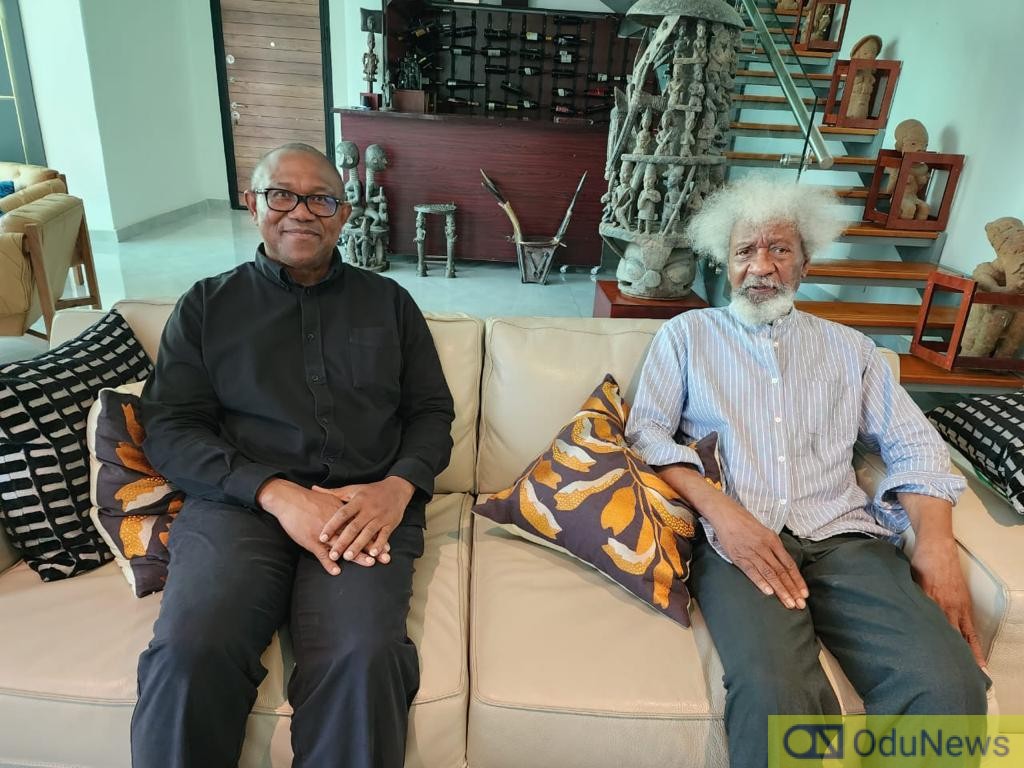Nobel Laurette Wole Soyinka says reports indicating that Peter Obi’s visit to his residence was aimed at reconciliation is inappropriate.

Soyinka spoke in a statement on Monday titled, “A visitation, and the allure of “reconciliation. ’’ Obi in a tweet after the visit noted among other things that he cherished the Sunday visit which was intended to “erase the needless misconceptions about the relationship between the great icon and the Obidient family. ’’
The Nobel laureate had, on Channels TV and later on Arise TV, in April faulted the manner the vice presidential candidate of the LP, Datti Baba-Ahmed, attempted to dictate to the Supreme Court during an interview on Channels TV over the election won by the presidential candidate of the All Progressives Congress, Asiwaju Bola Tinubu.
But the ‘Obidients,’ a term denoting Obi’s supporters, trolled Soyinka online, abusing him and an ex-deputy governor of the Central Bank of Nigeria, Kingsley Moghalu, who in a tweet described Soyinka as a phenomenon that “unlettered and uncultured people may not fully understand in an age of lazy social media in which many don’t read or think deep.”
The Nobel laureate in two separate statements in April, “Fascism on course,’’ and “Media responsibility,” responded, saying that the seeds of incipient fascism in the political arena had evidently matured.
Commenting on the reports about Obi’s visit, the essayist stated, “Before it gains traction and embarks on a life of its own, I wish to state clearly that the word “reconciliation,” inserted into some reports of Peter Obi’s visit to me yesterday, Sunday, May 7, is a most inappropriate, and diversionary invocation.’’
He added, “Let me clarify: I know the entity known as Peter Obi, presidential candidate of the Labour Party. I can relate to him. I know and can relate to the Labour Party on whose platform he contested elections. There are simply no issues to reconcile between those two entities and myself. However, I do not know, and am unable to relate to something known as the “Obidient” or “Obidient Family.” Thus, albeit in a different vein, any notion of reconciliation, or even relations – positive, negative or indifferent – with such a spectral emanation is simply grasping at empty air.
“During that meeting, attended by two other individuals only, the word “reconciliation” was never bruited, neither in itself nor in any other form. It simply did not arise. By contrast, there were expressions of “burden of leadership,” “responsibility,” “apology,” “pleading,” “formal dissociation from the untenable,” all the way to the “tragic ascendancy of ethnic cleavage,” especially under such ironic, untenable circumstances.’’
The elder statesman further said that the discussions were frank, and creative, reiterating that the notion of reconciliation was clearly non-applicable and never raised.
Soyinka stated, “The following should be understood, but never underestimated. What remains ineradicable from that weekend of orgiastic rave in the social media was the opening up of the dark, putrid recesses in the national psyche that we like to pretend do not exist. It invited – into minds seeking a grasp on reality – gruesome variations on images from Dante’s Purgatorio. A fathomless pit was exposed, at the bottom of which one glimpsed a throng of the damned, writhing in competitive lust for the largest of the gangrenous ladles in a diabolical broth. To peek over the edge of that pit for a prolonged spell was to turn giddy, with a risk of falling into the tureen of inhuman pus. To attempt to navigate one’s way, however gingerly, along a mat spread across the infernal abyss, is an invitation to moral suicide.’’
According to him, for the serious minded, he calls attention to essays he offered on the theme of reconciliation based on truth, and the ethical imperative of restitution.
The Nobel laureate said, “There will be further elaborations forthcoming in Democracy Primer III – Bookcraft’s Intervention series, now brought forward for publication on June 12, the watershed extorted from the current regime as the nation’s Democracy Day.’’
He noted that if from here on, he complied with entreaties from several valued, genuinely concerned directions, and ignored new provocations, however vile, it was only because he also approved of American boxer, Mohammed Ali’s strategy of rope-a-dope, where blind menace was left flailing hopelessly at the disdainful manifest of truth.


Comments are closed.